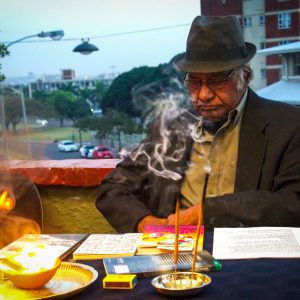Sharp Read | Prehistoric psycho for the win
An eSwatini chemist’s short story about early humans and murder has made it to this year’s Commonwealth prize shortlist. Yet, its author is disinclined to accept the title ‘writer’.
Author:
19 May 2022

Ntsika Kota’s ruminations about “a serial killer in a prehistoric hunter-gatherer society” has seen his story shortlisted for the 2022 Commonwealth Short Story Prize. It is the first time that a writer from eSwatini has made it on to this illustrious list.
Because the story comes in the wake of ugly political unrest in Kota’s native eSwatini, in which the king’s security forces have spilled the blood of many people, one might read it as a commentary on recent events. But such a reading might be off the mark.
The story – titled and the earth drank deep – attempts to imagine “the first time that human blood was spilled with callous intention”. The tale, which develops from the argument that human life as we know it began in Africa, is set in the southern part of the continent. The people speak a language that could be SiSwati, isiZulu, isiXhosa or isiNdebele.
“The premise of the story is the first serial killer, so it made sense to use a genericised version of a Nguni language and culture from the region. That’s all poetic licence, though. I imagine that, in reality, the language and culture of the first humans were something completely different than anything currently in existence. Two hundred thousand years is a long time,” says Kota.

Serial killers are driven by an almost complete lack of empathy, coupled with an extreme kind of narcissism. The story’s protagonist is a young hunter who, at his first hunt, watches with pleasure as a spear-pierced nyala struggles to draw its last breath. Instead of putting the animal out of its misery, he stands there enjoying its suffering, much to the annoyance and disapproval of Zungu, a fellow hunter and neighbour. These are people who, generally, killed animals for food and hides, and not for pleasure – except the young hunter.
Kota emphasises this point. He says, “[The hunter’s] enjoyment doesn’t come from the satisfaction of a job well done, or from the camaraderie of the party. His excitement is purely from the dying nyala’s pain and fear. That’s one of the early indications that his internal drive is quite different from that of his peers.”
Later in the story, there is an instance where the protagonist helps carry a girl mauled by a jackal to the settlement’s healer. It is a task he would much rather have avoided. He only takes it up because he found himself in the wrong place at the wrong time.
“The idea that the protagonist is devoid of empathy is emphasised when he sees the injured young woman,” says Kota. “He only decides to help because he is aware that he would look bad if he didn’t. He is never at all worried about her well-being. His actions can be viewed as those of someone who truly feels no concern for his fellow humans, other than that he maintains high status among them. Coupled with his fascination with watching life be extinguished, this creates a perfect storm for the little settlement.”
A man of science and, now, letters
Kota, born in eSwatini in 1993, went to schools in Mbabane and, for a year, in Simunye, the country’s sugar belt. He later went to South Africa’s Rhodes University where he qualified as a chemist.
Asked if he has always been writing, he says, “Not always. My academic ambitions always skewed towards the physical sciences. That was the course I followed through to postgrad. However, I enjoyed creative writing in high school quite a lot.”
He says he vividly remembers an assignment in high school where the class was required to write a story titled Heavy Rain.
Related article:
“I can’t remember the [exact] details of what I wrote, but I remember that I was very proud of how I flipped the title on its ear. I set it during a drought. My story was about a struggling farmer who ultimately loses his farm to the bank. In the closing paragraph, as the family drives away from their home, the first drops of a thunderstorm fall on the car’s dusty rear window,” says Kota.
“I never forgot about that story, and how much I enjoyed writing in general. Years later – well into my postgrad – I thought, ‘I wish I could write. I really enjoyed it,’ or something along those lines. Then, it occurred to me that nothing was actually preventing me from doing that. So, I opened a document on my computer and started writing things. That was in 2018, I think.”
Kota was very proud of the story that put his name in the Commonwealth prize shortlist too. In a video he sent to the prize committee, he said, “I chose to submit it to the Short Story Prize because, when I had written that story, I was very proud of it – and I wanted to know if that pride was misplaced or not … And there is no better stage on which to test that than the Commonwealth Short Story Prize.”
Literary forebears
The truism that it is through reading that one learns to write well applies to Kota. Even though eSwatini does not have an established and robust fiction-publishing industry, the writer has always managed to read. “Since I was a child I’ve had access to as many books as I could read, in diverse genres. I was fortunate that the schools I went to all had good libraries. That exposure to a lot of writing styles shaped my taste and interests,” he says.
Except for Salayedvwa Modison Magagula and a few young writers who self-publish, many in eSwatini whose books make it to people’s homes and schools, where fiction still has a place, write in SiSwati. It still sounds implausible when Kota, who is reluctant to call himself a writer, claims that he does not have many, or any, role models who are writers.
“I’m not a professional writer, and I’ve never had the ambition to publish so it never occurred to me to seek role models in writing. Also, the audience for my writing has almost exclusively been me. Nobody knows that audience better than me, so again I had no desire for guidance. You might say I’m some kind of single-celled writing organism, so I don’t have any literature parents.”

Be that as it may, the many other writers Kota has read have definitely had an effect on him, even if it is mere sensibility, a way of seeing the world. And they have made him appreciate stories. “I think storytelling is important because it allows us to share perspectives of the world and our existence with each other. And, in that way, we can enhance our understanding of ourselves and other people, and of the words that we all share,” he says.
The retiring writer has written many short stories “and two not-really novels” in recent years. But they were for his eyes only. It is our luck then that, this time around, he was confident and proud enough to share and the earth drank deep with the world. And we may well get a chance to read more. He plans to write “an Afro-futurist story that has been rattling around in [his] head for several years”.
Hopefully it will not be a tale about death that will have us contemplating our own mortality.
The Commonwealth Short Story Prize is awarded annually for the best piece of unpublished short fiction from any of the Commonwealth’s 54 member states. The 2022 shortlisted stories will be published online, at addastories.org. Regional winners will be announced on 23 May, before being published online by the literary magazine Granta. The overall winner will be announced on 21 June.

